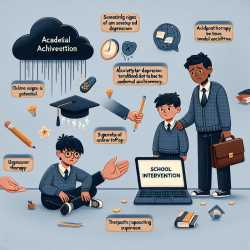Introduction
In the realm of education, understanding the multifaceted influences on academic achievement is crucial for developing effective interventions. A recent study titled "Impact of anxiety and depression on academic achievement among underserved school children: evidence of suppressor effects" sheds light on the complex interplay between mental health and academic performance, particularly in underserved communities. This blog explores the key findings of the study and offers insights for practitioners to enhance their skills and interventions.
Key Findings
The study focused on children aged 8 to 11 from underserved groups, including Hispanic, American Indian, and Black communities. It examined the unique relationships between anxiety, depression, attention, and hyperactivity with spelling and math achievement. Notably, the study found:
- Depression and attention problems were significantly negatively related to spelling and math scores.
- Anxiety and hyperactivity, when controlled for depression and attention, were positively predictive of academic achievement in math and spelling.
- These suppressor effects were more pronounced in female students.
Implications for Practitioners
For practitioners working in schools, these findings underscore the importance of a holistic approach to mental health and academic interventions. Here are some actionable steps:
- Comprehensive Assessments: Conduct thorough assessments that consider anxiety, depression, attention, and hyperactivity collectively rather than in isolation.
- Gender-Specific Interventions: Recognize that suppressor effects were more evident in girls, suggesting the need for tailored interventions that address gender-specific needs.
- Culturally Responsive Practices: Implement interventions that are sensitive to the cultural contexts of underserved children, particularly in Hispanic communities where cultural stress can exacerbate anxiety and depression.
Encouraging Further Research
While the study provides valuable insights, it also highlights the need for further research to confirm and expand upon these findings. Practitioners are encouraged to engage in or support research that explores:
- The long-term effects of anxiety and depression on academic trajectories in underserved populations.
- The efficacy of specific intervention strategies that mitigate the negative impacts of mental health issues on academic performance.
- The role of school climate and teacher-student relationships in moderating the effects of mental health on academic outcomes.
Conclusion
Understanding the nuanced relationships between mental health and academic achievement is vital for creating effective educational interventions. By leveraging the insights from this study, practitioners can enhance their strategies to support underserved children in achieving their academic potential. For those interested in delving deeper into the research, the original study can be accessed through this link: Impact of anxiety and depression on academic achievement among underserved school children: evidence of suppressor effects.










